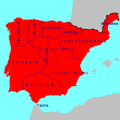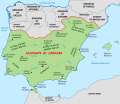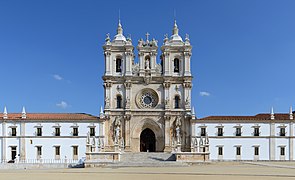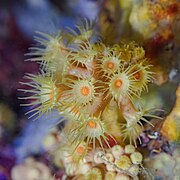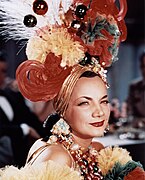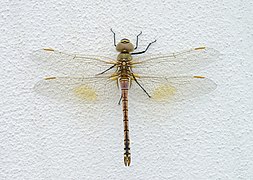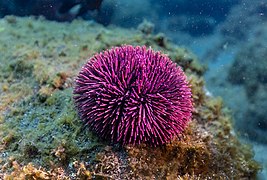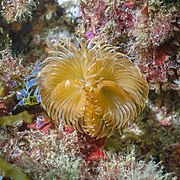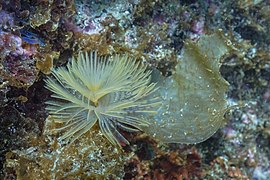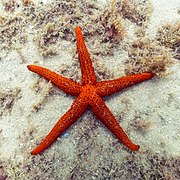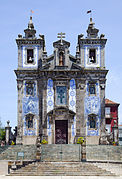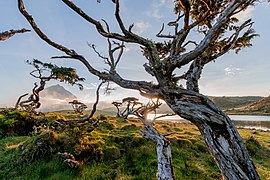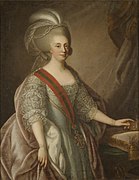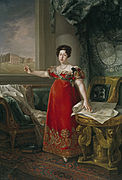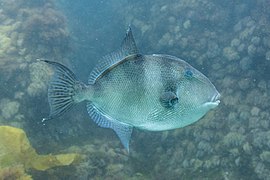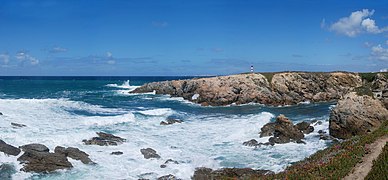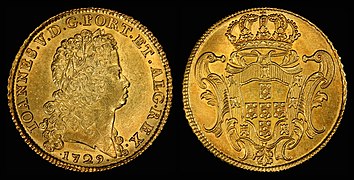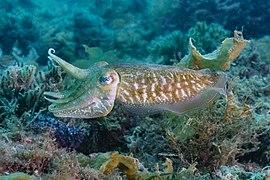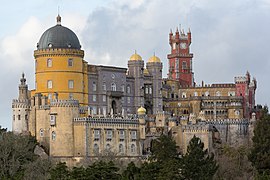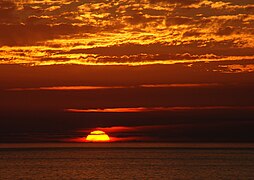Portal:Portugal
Welcome to the Portugal portal  Portugal, officially the Portuguese Republic, is a country located on the Iberian Peninsula, in Southwestern Europe, and whose territory also includes the Macaronesian archipelagos of the Azores and Madeira. It features the westernmost point in continental Europe, its mainland west and south border with the North Atlantic Ocean and in the north and east, the Portugal-Spain border constitutes the longest uninterrupted border-line in the European Union. Its archipelagos form two autonomous regions with their own regional governments. On the mainland, Alentejo region occupies the biggest area but is one of the least densely populated regions of Europe. Lisbon is the capital and largest city by population, being also the main spot for tourists alongside Porto and Algarve. One of the oldest countries in Europe, its territory has been continuously settled and fought over since prehistoric times. The territory was inhabited by the Celtic and Iberian peoples, such as the Lusitanians, the Gallaecians, the Celtici, Turduli, and the Conii. These peoples had some commercial and cultural contact with Phoenicians, ancient Greeks and Carthaginians. It was later ruled by the Romans, followed by the invasions of Germanic peoples together with the Alans, and later the Moors, who were eventually expelled during the Reconquista. First founded as a county within the Kingdom of León in 868, Portugal formally became an independent kingdom with the Treaty of Zamora in 1143. During the 15th and 16th centuries Portugal led the Age of Discovery and established one of the longest-lived maritime and commercial empires, becoming one of the main economic and political powers of the time. By the early 19th century, events such as the 1755 Lisbon earthquake, the country's occupation during the Napoleonic Wars, and the resulting independence of Brazil in 1822 led to a marked decay of Portugal's prior opulence. This was followed by the civil war between liberal constitutionalists and conservative absolutists over royal succession from 1828 to 1834. The 1910 revolution deposed Portugal's monarchy, and established the democratic but unstable Portuguese First Republic, later superseded by the authoritarian regimes of Ditadura Nacional (National Dictatorship) and Estado Novo (New State). Democracy was restored after the Carnation Revolution (1974), ending the Portuguese Colonial War and eventually losing its remaining colonial possessions. (Full article...) Selected article - Braga (Portuguese: [ˈbɾaɣɐ] ⓘ; Proto-Celtic: *Bracara) is a city and a municipality, capital of the northwestern Portuguese district of Braga and of the historical and cultural Minho Province. Braga Municipality had a resident population of 193,333 inhabitants (in 2021), representing the seventh largest municipality in Portugal by population. Its area is 183.40 km2. Its agglomerated urban area extends to the Cávado River and is the third most populated urban area in Portugal, behind Lisbon and Porto Metropolitan Areas. It is host to the oldest Portuguese archdiocese, the Archdiocese of Braga of the Catholic Church and it is the seat of the Primacy of the Spains. During the Roman Empire, then known as Bracara Augusta, the settlement was the capital of the Roman province of Gallaecia and later would become the capital of the Kingdom of the Suebi that was one of the first territories to separate from the Roman Empire in the 5th century. Inside of the city there is also a castle tower that can be visited. Nowadays, Braga is among the most noted entrepreneurial and technological centers of the country, as well as a major hub for inland Northern Portugal, and it is an important stop on the Portuguese Way path of the Road of St James. The city hosted two games of the UEFA Euro 2004 and was the European Youth Capital in 2012. (Full article...)This is a Featured article, which represents some of the best content on English Wikipedia.
The Mozambican War of Independence was an armed conflict between the guerrilla forces of the Mozambique Liberation Front or FRELIMO (Frente de Libertação de Moçambique) and Portugal. The war officially started on September 25, 1964, and ended with a ceasefire on September 8, 1974, resulting in a negotiated independence in 1975. Portugal's wars against guerrilla fighters seeking independence in its 400-year-old African territories began in 1961 with Angola. In Mozambique, the conflict erupted in 1964 as a result of unrest and frustration amongst many indigenous Mozambican populations, who perceived foreign rule as exploitation and mistreatment, which served only to further Portuguese economic interests in the region. Many Mozambicans also resented Portugal's policies towards indigenous people, which resulted in discrimination and limited access to Portuguese-style education and skilled employment. (Full article...)General imagesThe following are images from various Portugal-related articles on Wikipedia.
Selected quote -"There are several kinds of states: socialist states, corporative states, and the state we've arrived at!"
Há diversas modalidades de Estado: os estados socialistas, os estados corporativos e o estado a que isto chegou! Salgueiro Maia to his troops on the evening of 24 to 25 April 1974 This is a Good article, an article that meets a core set of high editorial standards.
 Bombay, also called Bom Bahia or Bom Baim in Indo-Portuguese creole, Mumbai in the local language; is the financial and commercial capital of India and one of the most populous cities in the world. It's also the cosmopolitan city centre of the Greater Bombay Metropolitan Area, and the cultural base of the Bollywood film industry. At the time of arrival of the Portuguese Armadas, Bombay was an archipelago of seven islands. Between the third century BCE and 1348, the islands came under the control of successive Hindu dynasties. The Delhi Sultanate had been ruling the area along with Chaul, New Bombay (Thana) & Damaon, with the administrative centre in Bassein (Vasai) since the raids of Malik Kafur in the Konkan region and across the Indian subcontinent. This territory in North Konkan along with the Bombay islands were later taken over by the Sultan of Guzerat from 1391 to 1534, when he had declared the end of the suzerainty to Delhi, after the Timurid invasion of it. Growing apprehensive of the power of the Moghal emperor Humayun, Sultan Bahadur Shah of Gujarat was obliged to sign the Treaty of Bassein on 23 December 1534; according to which, the seven islands of Bombay, Fort San Sebastian of Bassein in strategic town of Bassein (Vasai), and its dependencies were offered to the Portuguese East Indies. The places were only later officially surrendered on 25 October 1535, by the Sultan of Guzerat. The Portuguese in Goa-Anjediva and Bombay-Bassein were actively involved in the foundation and growth of their Latin Christian religion in Bombay and the neighbour area. They called the island by various names, which finally took the written form Bom Baim, when the islands were leased to several Portuguese officers during their regime. Portuguese Franciscans and Jesuits built several churches in the city, prominent ones are the St Michael's Church at Mahim, St John the Baptist Church at Andheri, St Andrew's Church and the Basilica of Mount Bandra (Bombay) at Bandra, and Gloria Church at Byculla, Holy Spirit Church Nandakhal at Virar. The Portuguese also built several fortifications around the city like the Bombay Castle, Castella de Aguada (Castelo da Aguada or Bandra Fort), and Madh Fort. (Full article...)Selected Biography - Selected picture -Did you know -
Portugal topicsPortugal lists
SubcategoriesRecognized content
Featured articles
Former featured articlesFeatured listsFormer featured listsGood articles
Former good articlesDid you know? articles
Featured pictures
Former featured portalsIn the News articles
Main page featured articles
Picture of the day pictures
Featured topicsNew articlesThis list was generated from these rules. Questions and feedback are always welcome! The search is being run daily with the most recent ~14 days of results. Note: Some articles may not be relevant to this project.
Rules | Match log | Results page (for watching) | Last updated: 2024-05-16 21:16 (UTC) Note: The list display can now be customized by each user. See List display personalization for details.
Things you can doRelated PortalsRelated WikiProjects
Associated WikimediaThe following Wikimedia Foundation sister projects provide more on this subject:
Discover Wikipedia using portals |


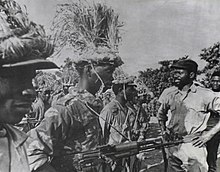























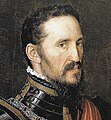


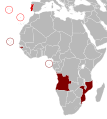
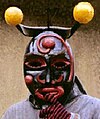

![Image 30Maios celebration in Madeira island [1] (from Culture of Portugal)](http://upload.wikimedia.org/wikipedia/commons/thumb/e/e1/2011-03-05_03-13_Madeira_045_Santana_%285543431418%29.jpg/120px-2011-03-05_03-13_Madeira_045_Santana_%285543431418%29.jpg)







